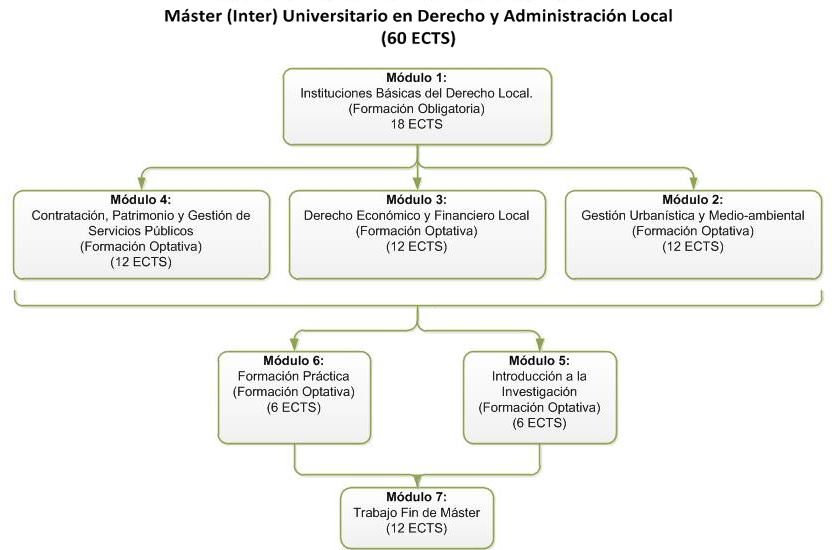Structure and distribution of credits
{{pre.error[0].message}}
{{pre.error[0].message}}
| Course | Basic | Mandatory | Optatives | Curricular internships | End of Studies Dissertation | Total |
|---|---|---|---|---|---|---|
| {{curso}}º | {{c.credects}} | {{c.credects}} | {{c.credects}} | {{c.credects}} | {{c.credects}} | {{creditos | map: 'credects' | toArray | sum}} |
| Total | {{ct.credects}} | {{ct.credects}} | {{ct.credects}} | {{ct.credects}} | {{ct.credects}} | {{cre.creditos_totales | map: 'credects' | toArray | sum}} |
The Official Master's in Law and Local Administration is organised in 2 semesters, each of which has 30 ECTS, throughout an academic year. Compulsory basic training and 12 elective credits will be taught in the first semester. The remaining 18 elective credits and the Master’s Thesis will be taught in the second semester.
The Compulsory Module (Basic Institutions of Local Law) consists of six basic training subjects in Law and Local Administration. It will take place in the first semester and is designed to provide students with basic training on the operation and regulation of local public bodies, based on fundamental regulatory texts. It is given in the first semester and comprises the following subjects:
The elective Module "Urban Planning and Environmental Management" provides an specific training in one of the most important and controversial competencies of the local authorities, such as urban planning management, which has to take into account the environmental protection and the local development sustainability. It is taught in the first semester and is composed of the following subjects:
The Elective Module "Local Economic and Financial Law" provides students with local financing training, dealing with local resources and the budget cycle as well as with the implementation and control of expenditure, in addition to training in local accounting. It is taught in the second semester and is composed of the following subjects:
The Elective Module "Procurement, Assets and Public Services Management" teaches the regulations and ruling principles of Public Administration with respect to the goods and services to be acquired and also the management during their ownership, as well as the Administration intervention providing public services searching for quality, transparency and efficiency. It is taught in the second semester and consists of the following subjects:
The previous 3 modules close a first elective choice in order to complete the master's degree, students must have successfully completed at least 24 ECTS of the subjects of such modules. From there, a second elective choice is opened with two different modules from the previous 3, of which students must necessarily take one. Thus, students must opt for Practical Training or Introduction to Research (6 credits in both cases) depending on the preference for more professional or academic-oriented training. In any case, it is recommended that those students who wish to take the Doctorate later carry out the methodology course.
The Introduction to Research Module comprises a single subject (Methodology: Introduction to Research) and trains students in the legal methodology necessary to carry out research work. Through this pathway, the regulatory requirements for future access to a doctoral program are met.
The Practical Training Module also comprises a single subject (Practicum), consisting of the carrying-out of internships in Public Administrations and in private companies that are related with Law and Local Administration, in such a way that students can corroborate the learned knowledge with the running of these entities. Both are made up of 6 credits and are given in the second semester. The subject will be managed by the University of Almeria or the University of Burgos, depending on the student.
In addition, students will take a 12 ECTS Master’s Thesis. It may be a theoretical or applied project, depending on whether the student has completed the Practical Training module or the Introduction to Research module. In both cases it has to have, a structure of scientific work and to deal with any of the subjects studied in the Master.
The Master is fully distance taught. Both the University of Almeria and the University of Burgos have their respective virtual platforms, although only one of them will be used.
